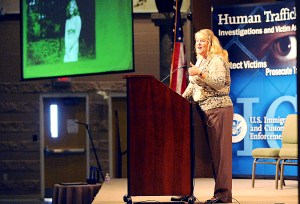AUBURN — At age 15, Theresa Flores was forced into sex slavery. But it wasn’t until she was 40 that she realized she had been a victim.
More than 100 people attending a conference on human trafficking at East Auburn Baptist Church listened to her story Thursday afternoon.
Living in suburban Detroit, Flores was at a new high school one day when an older boy in her class gave her a ride after school and told her he liked her, she said.
He ended up drugging and raping her, then threatened to show photos of her while she was unconscious. He said he would kill her family if she told anyone.
For the next two years, she lived in a dark world where she was drugged, raped and tortured by strangers.
She would sneak out of her upper-middle-class home in her pajamas at midnight to meet the boy who had extorted her with the photos, having told her she would have to “earn them back.”
He drove her to various “upscale, beautiful homes” in affluent neighborhoods where she was forced to perform sex acts, sometimes bound, sometimes tortured with strange men in basement bedrooms “until they were finished with me.”
The boy would drive her home hours later, where she would take a hot bath, cry and pray, she said. She never told her Irish Catholic parents what happened.
She continued to go to school, but her grades dropped from A’s to F’s and her health suffered, she said. She was watched and followed day and night.
“It’s a horrible way to live,” she said.
Decades later, after losing her way while driving in the Detroit area, Flores remembered in a flashback the worst night of her life that had changed everything.
She had waited in her pajamas at midnight on the side street for the boy with the pictures to pick her up. Instead, a man from a mafia crime ring showed up.
“They kidnapped me that night,” she said. “They threw me in the car, drugged me, beat me and drove me really far away from home.”
She was taken to a cheap motel in the inner city.
“There is no word in the English dictionary that will describe that feeling,” she said. “‘Terrified’ doesn’t cut it.”
They dragged her by her hair out of the car and into a motel room where at least two dozen men were waiting. She was the only girl.
A man announced: “This is what the boss sent for you to enjoy.” She was auctioned to one man after another until she passed out, she said.
She awoke naked with no ID or money and no idea where she was.
She found her pajamas soaked in the bathtub.
“Nobody understood,” she said. “Nobody knew.”
She stumbled into a nearby diner.
“My angel came in the form of someone I never would have crossed paths with,” she said. A waitress working the 5 a.m. shift eyed her.
“She knew,” Flores said. “She knew the signs.”
The waitress asked if she could help Flores. The girl said she was fine. The waitress didn’t believe her and called the police.
Today, Flores travels the country telling her story and educating folks about human trafficking and how it happens to girls everywhere, regardless of age, race and socioeconomic status.
She holds a master’s degree in education and works as a teen counselor.
A few years ago, Flores was urged by a colleague to attend a conference on human trafficking.
Five minutes into the conference, Flores said, “tears started to stream down my face. I finally had the words of what to call it … I had lived this.”
As the mother of two teenage daughters, Flores knew how important it was to prevent her story from happening to anyone else.
“I realized I needed to put a face to this,” she said.
Her grandfather was a famous judge and lawyer. He had been sought as a prosecutor at the Nuremberg Trials in post-World War II Germany. Her father had a high-paying job at General Electric Co.
“That did not exempt me from having this happen to me,” she said.
Besides sharing her story, Flores started supplying motels in areas where large conventions are scheduled with soap that comes wrapped in a label that includes the phone number for a national human trafficking hot line. She also supplies missing children posters.
At the end of her talk, Flores, who now lives in Columbus, Ohio, showed her audience a slide of a girl in that city who was advertised for prostitution on a website.
“I do this for her,” Flores said. “I don’t want her to go through what I did.”



Comments are no longer available on this story